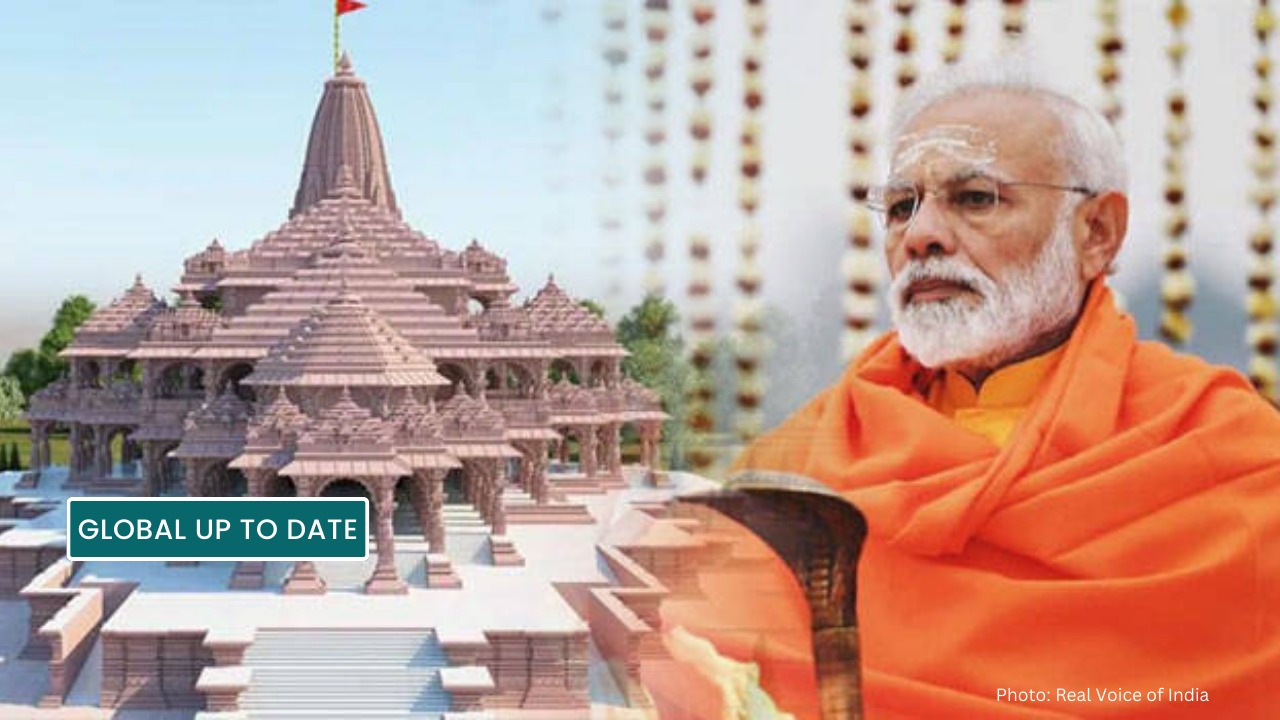Ayodhya's Ram Mandir Inauguration and Its Impact on Indian Politics
Sadia Tasneem | 12 February 2024
On January 22, 2024, Prime Minister Narendra Modi officially unveiled a substantial Hindu temple in Ayodhya, India. The temple, also called Ram Mandir, is being built on the site of Babri Mosque that dates back to the 16th century. For almost 150 years, there has been a burning conflict between the Muslims and Hindus of India over Ayodhya. Muslims claim it to be a historically significant site of devotion, however Hindus proclaim that the mosque was constructed by the Mughal emperor Babur on the location of an earlier temple dedicated to Ram's birthplace.
In 1853, a Hindu sect claimed that, the Babri Masjid was constructed in 1528 on the site of a temple.The court battle over the mosque starts in 1885. Mahant Raghubir Das filed the first lawsuit in an attempt to develop a temple on the property next to the mosque. The district magistrate of Faizabad, however, declined to provide consent. In 1949 right after the independence, Lord Ram was said to be appeared in dreams under the Masjid's main dome, according to a Hindu priest named Abhiram Das. The Hindu devotees began praying after idols emerged inside the mosque on the evening of 22December 1949, thinking it to be a sign from God. On 23December 1949, however, then-UP CM Govind Ballabh Pant was notified by then-DM of Faizabad, KK Nayar, about a group of Hindus entering the location and placing the idol.The property was attached by the city magistrate after a formal complaint was filed.From 1950-1961,four civil lawsuits have been filed within the court, ranging from a Muslim organization requesting ownership and proclamation of the site to the ability to conduct Hindu rites there.
The Vishwa Hindu Parishad (VHP) and other far-right Hindu organizations organize a committee to lead the building of a Hindu temple in 1984.In 1990,Lal Krishna Advani, a prominent member of the BJP, was spearheading a national initiative to replace the mosque with a temple. Advani's arrest in the eastern state of Bihar was the outcome of a countrywide campaign that left a path of bloodshed in its wake. On 6 December 1992, far-right Hindu rioters destroyed the mosque, sparking widespread Hindu-Muslim riots that claimed the lives of over 2,000 people,the most of them were Muslims.
The contentious ownership issue between Muslims and Hindus came to a conclusion in 2019.On 9 November 2019, in a historic decision that was made public under increased security around the nation, the Indian Supreme Court granted Hindu’s ownership of the antagonistic holy site of Ayodhya so they may build a temple there. And Muslims will receive five acres of land at a different location in the northern state of Uttar Pradesh, near Ayodhya.The verdict comes just six months after India's prime leader, Narendra Modi, and his Bharatiya Janata party (BJP) administration won a landslide election. The BJP government has made the reconstruction of the Ram temple in Ayodhya a central goal of its Hindu nationalist platform.
India has witnessed widening social and religious divides ever since the Hindu nationalist BJP, led by Narendra Modi, first came to power in 2014.Since the BJP came to power, MPs, ministers, and other party leaders have been the leading voices in favor of building a Hindu temple at Ayodhya.Textbooks used in schools no longer include any history of Muslims.Many individuals have been killed by vigilantes as a result of restrictions on the sale and slaughter of cows, which are revered by most Hindus as holy animal. The bulk of the victims were Muslims who were transporting livestock.Tension between the religions has also been exacerbated by the unrestrained exhibition of strong Hindu nationalism in other places.The Modi administration's action in August 2019, that resulted in Kashmir losing its long-standing semi-autonomy was also perceived as a direct attack on the Muslim community. The nation's home minister, Amit Shah, most recently declared that he will expunge "illegal migrants", who are presumed to be Muslimsfrom the nation via a government program that has just been implemented in the northeastern state of Assam.
Monthsahead of the general elections, the opening of the temple is perceived as a sign of religious triumphalism. This is expected to further polarize politics and help the ruling Bharatiya Janata Party (BJP) for upcoming election. According to general people, Ayodhya is just the beginning. Disagreements and legal battles over mosques are also raging in Mathura and Varanasi, which are both known to locals by the former name, Kashi.
Sadia Tasneem is a Research Assistant at CGS
The views expressed in this write-up are solely those of the author and do not necessarily reflect the policies of CGS.
